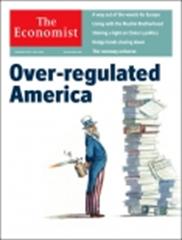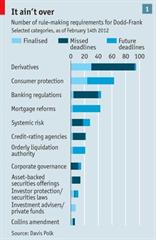The 2,300-page Dodd-Frank Act is a disastrous piece of legislation that is burdening the economy, increasing the size and scope of the Federal bureaucracy, and making the American financial system less transparent and less functional.
That is the conclusion of an in-depth article in The Economist titled “Too Big Not to Fail” that appears in the magazine’s Feb. 18 edition and is part of its cover story “Over-regulated America”.
 |
At a time when Americans are still suffering under a sluggish economy, the last thing their government should be doing is increasing the costs of doing business in America and killing innovation. Unfortunately, The Economist says this is exactly what Dodd-Frank does.
Noting that “the scope and structure” of Dodd-Frank is “fundamentally different” from previous Federal law, the article goes on to explain how the Act expands Federal power in unpredictable ways:
“‘Laws classically provide people with rules. Dodd-Frank is not directed
at people. It is an outline directed at bureaucrats and it instructs them to
make still more regulations and to create more bureaucracies.’ Like the
Hydra of Greek myth, Dodd-Frank can grow new heads as needed.”
The Economist also highlights the impact these new regulatory burdens can have on the country as a whole:
“But the really big issue that Dodd-Frank raises isn’t about the institutions it
creates, how they operate, how much they cost or how they are funded. It is
the risk that they and other parts of the Dodd-Frank apparatus will
smother financial institutions in so much red tape that innovation is stifled
and America’s economy suffers…
Though The Economist has no objections to addressing the causes of the 2008 financial crisis through legislation, it can find little to praise in the new law:
 |
The article also reminds us that the full extent of the damage is still impossible to determine as “only 93 of the 400 rule-making requirements mandated by Dodd-Frank have been finalized.” The Economist does not need to wait for the additional 307 pieces of red tape to lay judgment on the “Dodd-Frankenstein monster.”
“Ambition is often welcome; but in this case it is leaving the roots of the
financial crisis under-addressed—and more or less everything else in
finance overwhelmed.”